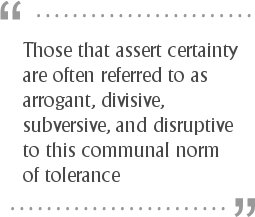1 Peter 3:19-20, "the spirits in prison"
Discussion thread for 1 Peter 3:19-20 Who were the “spirits in prison”? Comment: Not trying to just provoke debate. It’s the text for my SS lesson for Sunday. So get back to me right away! :)
As iron sharpens iron,
one person sharpens another. (Proverbs 27:17)
Discussion thread for 1 Peter 3:19-20 Who were the “spirits in prison”? Comment: Not trying to just provoke debate. It’s the text for my SS lesson for Sunday. So get back to me right away! :)
 Republished with permission from Baptist Bulletin Nov/Dec 2010. All rights reserved.
Republished with permission from Baptist Bulletin Nov/Dec 2010. All rights reserved.
by David Mappes
Imagine you are the quarterback in a bowl game, dropping back for a pass. As you look downfield, you notice that all the players on both teams are wearing jerseys in subtle shades of gray—and you can’t tell them apart. Confused, you call for a huddle and begin reading from the playbook strapped to your arm. Players interrupt and begin to argue, shouting “No, that’s not what the coach means by ‘screen pass!’” “Yes, it is!” and then, “That’s just your interpretation!”
This imaginary scene may seem chaotic, but it is a fitting description for current trends in hermeneutics and theology. Careful pastors and church members need to understand subtle but important differences in terminology that are being adopted by a new generation of scholars.
“Hermeneutics” comes from the Greek term hermeneuo, which carries the idea of explaining, interpreting, or translating the sense of one language to another. In a more technical sense, the term denotes the science and art of interpretation; thus various rules and norms of interpretation are employed to determine the author’s meaning in the text. These interpretive principles are not always fully agreed upon or consistently practiced, but until recently, literary scholars have agreed that the author’s intended meaning could be understood and correctly applied. And until recently, evangelical believers have contended that we can understand the Author’s intended meaning and apply it to our lives.
Thread to discuss this important text. John 1:12-13
But as many as received Him, to them He gave the right to become children of God, to those who believe in His name: 13 who were born, not of blood, nor of the will of the flesh, nor of the will of man, but of God.
 Republished with permission from Dr. Reluctant. In this series, Dr. Henebury responds to a collection of criticisms of dispensationalism entitled “95 Theses against Dispensationalism” written by a group called “The Nicene Council.” Read Part 1, Part 2, Part 3, Part 4, Part 5.
Republished with permission from Dr. Reluctant. In this series, Dr. Henebury responds to a collection of criticisms of dispensationalism entitled “95 Theses against Dispensationalism” written by a group called “The Nicene Council.” Read Part 1, Part 2, Part 3, Part 4, Part 5.
Contrary to the dispensationalists’ claim that “prophecies in the Old Testament concerning the first coming of Christ … were all fulfilled ‘literally’ ” (Charles Ryrie), many such prophecies were not fulfilled in a “plain” (Ryrie) literal fashion, such as the famous Psalm 22 prophecy that speaks of bulls and dogs surrounding Christ at his crucifixion (Psa 22:12, 16), and the Isaiah 7:14 prophecy regarding the virgin, that “she will call His name Immanuel” (cf. Luke 2:21), and others.
Response: The premise behind this objection is that since the Bible employs figures of speech and imagery it cannot be interpreted “literally.” The beasts in Psalm 22:12, 16 are literal men. They symbolize the animosity of the people towards David, and, prophetically, towards Christ on the Cross. The poetic use of these beasts only intensifies the literal predicament being expressed.
The Isaiah prophecy is fulfilled in Christ since He is, literally, “God with us.” But here at last we are presented with an issue which might give us pause. Mary called Him “Jesus.” Does this mean that we are to infer that Mary did not call Him “Immanuel”? It is true that on the basis of this passage some may have expected the Messiah would receive the proper name “Immanuel,” when in fact, this was a descriptive identification of Christ’s person.
 Republished with permission from Baptist Bulletin Nov/Dec 2010. All rights reserved.
Republished with permission from Baptist Bulletin Nov/Dec 2010. All rights reserved.
By Liz Gifford
Dad and Mom and their high school son or daughter sit at a table piled with college catalogs, applications, and scholarship forms. “I would really like to study chemistry or biology at the university, Dad.”
“But you know the big news stories coming out of the universities are about professors not getting tenure or even being fired because of their Christian stand on contemporary issues. What are your chances of having classes under an instructor who isn’t an atheist?”
“All I hear is how the university is a negative influence on Christians. Not the place I want to send you,” Mom adds.
“But I enjoy physics and chemistry and math, and I get good grades in those classes. I could help find a cure for cancer or work with plants and find a source of food to end hunger around the world.”
So the discussion goes as parents struggle to help their young people make the right choice of a place to study to be what God wants them to become.
Christian young people who wish to take advantage of the programs offered by a secular university, who wish to study under professors who are leaders in their areas of expertise, who want a diploma from an outstanding institution of higher learning are going to have to confront ideas that challenge their Christian beliefs. These are found in most areas of study, but highly volatile topics come under scrutiny in the sciences. Biology, archaeology, chemistry, and physics classes will force Christian young people to examine what they believe.
 At the risk of Bauder overload, we offer here two posts from the archive on the subject of patriotism—in honor of election day. (These posts appeared at SI on July 6 and 9 of 2005 but did not make it back into the article database after “the crash of 2006.”) The original discussion of part one may be read here. Part two here.
At the risk of Bauder overload, we offer here two posts from the archive on the subject of patriotism—in honor of election day. (These posts appeared at SI on July 6 and 9 of 2005 but did not make it back into the article database after “the crash of 2006.”) The original discussion of part one may be read here. Part two here.
During late June or early July, American Christians bedeck their churches with red, white, and blue. They lift their voices in hymns of praise to their nation. They repeat a solemn, public vow, pledging their allegiance to the government represented by the flag of the United States. Their chests swell and their eyes moisten with thoughts of the greatness of their nation—for their nation is great. Gauged by the combination of military might, distributed wealth, and human political freedom, it is unparalleled in human history.
At such moments, we Americans need to remember two things. First, greatness is not identical with goodness. Second, if America is great, we are not the ones who made it great. We can take no credit. What we have received is given to us as a gift and a stewardship. It is up to us to do the right things with it.
The inclusion of patriotic exercises as part of American worship perplexes and even annoys Christians throughout the rest of the world (beginning with our immediate neighbors to the north and the south). Some question the value of patriotism in general; others simply object to expressions of nationalism in church. In turn, Americans often find these objections puzzling and sometimes off-putting.
Should Christians be patriotic at all? If so, then should they carry their patriotism into their churches? I would like to offer tentative answers to these questions—tentative because I am an American and I share most of the American sensibilities. Therefore, my answers will hardly qualify as impartial. The questions, however, are important and should not simply be dismissed.
Discussion